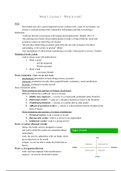Week 1, Lecture 1 - What is work?
Work
- how people stay alive, (post) industrial society is about work, a part of our identity, our
society is centered around work, interaction with people (and that is sociology)
Definitions
- “work has become synonymous with regular paid employment” (Edgell, 2012:1)
- “the carrying out of tasks which enable people to make a living within the social and
economic context in which they are located
- “all activities which bring economic gains from the one who is doing it, his direct
surrounding, or for society in general” (Mok)
- “any expenditure of effort aimed at producing a socially valued good or service” (Vallas)
Meaning of work: 2 ideas
- work is always seen with ambivalence
1. Work is good
- self-development
- Maslow pyramid
2. Work is bad
- a necessary burden
Work orientation = how we see our work
- instrumental: orientation towards things (money, security)
- relational: orientation towards 'other people'(friends, workmates, social satisfaction)
- personal: orientation towards oneself
these orientations differ:
Work orientation and typology of workers (Lockwood)
- different workers have different views on society
1. Middle class employees → society is a consensually graduated status hierarchy
2. Deferential workers → same as 1, but place themselves lower in the hierarchy
3. Traditional proletarian → society is a conflict driven class model
4. Affluent of privatized workers → society is a desocialized structure divided on the
basis of money
Work orientation and typology of workers (Goldthorpe)
1. Privatized worker: work is means to an end
2. Bureaucratic worker: work is a service to an organization
3. Solidaristic worker: work is a group activity
Work vs Labour (Hannah Arendt)
- labour: the bodily activity designed to ensure
survival in which the results are consumed almost
immediately
- work: the activity undertaken with our hands which
gives objectivity to the world
- critique: we are not able to make the distinction in
history
Work vs. Occupation (Brown)
- work: has been imputed with transformative
capacity - an activity which alters nature
, - occupation: something that locates individuals in some sort of market
Work and the state
- economic value prevails above political value
- citizens are divided in:
- paid work → paying taxes, it is important for the state
- unemployed → taxes sustain old, sick, unable to work
Work and gender
- most empirical studies are based on male workers
- household tasks are not considered work (not paid)
Centrality of work = importance of work in somebody's life,
compared to other aspects of life
- Japan = extremely high, USA and the Netherlands = very
high
- Societal norms and Work goals → Work capacity →
Meaning of Work
, Week 1, Lecture 2
Primitive
- no work or occupation in the modern sense
- labour/work = life
- typical day: wake up, work (gather
food), consumer the food, rest
- work is not differentiated
- little division of labour except
- very young
- picking berries & nuts
- very old
- sedentary tasks like
cooking
- women
- pregnancy
- no hunt
- heavy work
→ Turning point = development of agriculture - Horticultural society: cultivation of plants
- systematic raising crops and animals for consumption
- suddenly surplus of food = time for other things
- manufacturing weapons, luxury goods
- spirituality: priests, magicians, ministers Q
- stat: politicians, clergy, soldiers
→ division of labour, end of communal & egalitarian
societies
Ferguson = how does the inequality start to exist?
- farming
- Matthew effect = the ones who have more than
others will have more and more
- Bible: those who have more will be given
and those who have little will get less
Classical - BC
- Agriculture → makes families self-sufficient - Agrarian society
- affluent farmers joint the elite of society (kings, nobles warriors, priests)
- Egypt and Mesopotamia
- Rigid class system
- top: elite, middle: craftsmen, merchants, bottom: slaves
- but: family farms are the norm, smalls cale, not much division of labour
- not much intensification of work/output
- water wheel
- increase of markets: more need for urban craftsmen
- traveling, settling in small cities
- more consumption
, - increase cross national commerce (e.f. in around Mediterranean sea)
- Athens: potters
- Pompeii: wool finishing
- impressive accomplishments: Egyptian pyramids, Roman buildings, bridges,
- 3 burdens of classical world
1. Lack of powered machinery
2. Lack of sophisticated mechanical device
3. Lack of suitable harnesses to make the most of animal power
solution? slaves (masses of workers)
Middle ages
500-1000 AD (dark ages)
- period of regression, although a rapid decline of slavery
- back to scale production
- growing respect for manual labour
- new technologies
- new types of plows, harnesses, boats
- change from two to three field agriculture system (=more food)
from 1100 AD
- revival of the economy, growth of cities
- guild revived and expanded (nowadays could be compared to an employer
- 2 groups of workers: Master craftsman and apprentices
- protecting the individual crafts
- just wages, just prices, quality control
- mostly small scale enterprises
- some large scale industries
- Flanders: manufactures buying fleece → wavers (home with help family) →
manufacturer (finished the process) → sell the customer
- international division of labour
- England: fleece
- Flanders: woven into clothes
- Italy: dyed and finished
- sold to Arabic states
- Construction of cathedrals
- no slaves but someone in charge
- free, hired and paid skilled craftsmen
- work-related inventions
- double entry bookkeeping (expenses, income, what I need to order)
- commercial credit
- marine insurance
- under way
- development of urban centers
- improvement in plant and livestock
- creation of new farm equipment
- replacement of 3 to 4 field method
→ leading to more surplus, and larger markets for 'luxury goods'





